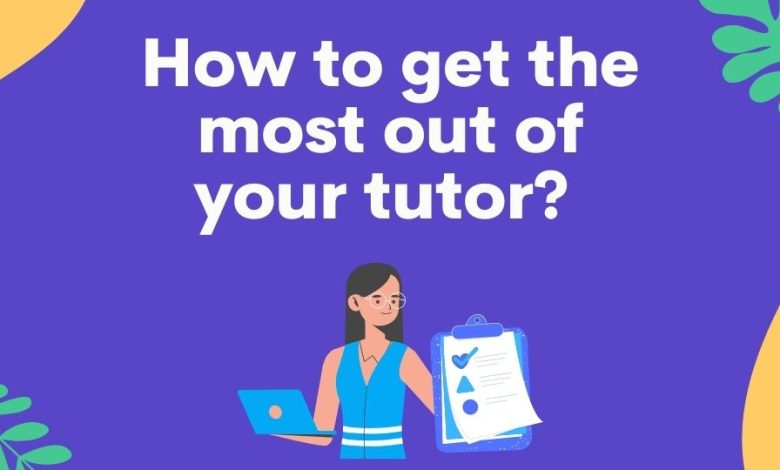How to get the most out of your tutor?

The importance of a tutor’s role in your group and choosing a good one is critical. The following suggestions are based on my experience from teaching at university, working with researchers inside companies, and reading other people’s accounts about their experiences.
Be clear about what you want to get out of your sessions.
Do you want to know how to use a certain technique? Do you want help with an ongoing project or you need feedback on your progress or writing style or both? What sort of ‘tweaks’ are you hoping for – grammar advice, advice about particular sentences, clarification requests, additional reading suggestions, etc.? Are you hoping for help with ideas or to learn about particular methods?
Knowing what you want will help your tutor know what advice they should give. For example, suppose the issue is punctuation. In that case, several general tips could work in most cases (i.e., use the most logical and natural punctuation, use semicolons instead of commas to separate clauses, etc.). In contrast, some other suggestions will be more relevant for some students than others.
My article on the four types of writing tasks you encounter as a college student may help you identify your own needs from your tutor.
Think about what you don’t feel comfortable asking your tutor.
In my experience, students often depend on their tutors to identify areas that need work and to point out the relevant references. It works well for a lot of students. Still, others have their ideas about what they want to work on – if you fall into the latter category, think about whether there is anything your tutor could do to help you with these things or any resources they might be able to point you towards. If you know where the gaps in your knowledge are (e.g., looking at past exam questions), being explicit about them can help your tutor give better advice. Finally, if you want feedback (e.g., an outline of some recent results or a section of your introduction), ask for it!
Be realistic about what you can expect from your tutor.
Tutors are human beings with limitations on the amount of time and energy, and they may not be able to give as much feedback as you’d like on every question you ask. Still, there are things that you could do to help: if you ask several questions in one email, expecting a detailed answer to each one, the message is likely to get lost amongst all the others – replying ‘I’ll look at this next week’ is frustrating for both parties if there’s too much material for them to cope with; similarly, asking ‘do you know any references on X?’ when there are several hundred references on X out there is also likely to get you a ‘no’ for an answer.
Try to see your tutor as a colleague rather than someone who tells you what to do.
If you’re lucky, this may happen naturally, but if not, try explicitly communicating it – e.g., by asking about their research or pointing them towards the most interesting papers in your field. You should feel comfortable talking honestly with your tutor about any topic – including criticism of their suggestions! Being able to talk openly will help both of you develop ideas for individual sessions and help both of you understand each other’s needs better.
There are tutoring sites like myphysicsbuddy that incorporate this same logic. So much so that even the name contains “buddy” in it. If you want a friend like physics tutor, then this is the site to be.
Don’t expect your tutor to have all the answers.
Of course, you’re their ‘client,’ not their friend; but it can be very frustrating to get smart questions that have clear indications of problems in your work – and no real way for the tutor to help. If you’re asking a broad question, try giving them ideas about where the holes in your understanding might lie. They may be able to point out some resources without even needing to answer the specific question, even though it may seem like they should know everything there is to know about every topic!
Of course, if others have told you that you need more references on X, this doesn’t mean that you shouldn’t ask your tutor directly about it as well. In addition, I think it’s always useful to be specific about what you’re asking – e.g., ‘I need a suggestion for a good reference on X’ is much more useful than ‘do you know any references?’
Same is the case with any tutors. be it the best online tutor or an excellent tutor near you. They might not know all the answers! Accept it. They are human beings.
Try to have a detailed plan at the beginning of your project.
You may think this is obvious, but it’s amazing how many students seem vaguely aware that they should do some work and then wander around aimlessly until they find their level. If you haven’t written up an MSc or Ph.D. before, ask someone who has if anything seems unclear, and clarify it as well as you can from the start. Even if your supervisor isn’t able to look at your first draft, s/he may be able to spot problems that you don’t – or give ideas about resources that will help.
Your research proposal is a map, not a shopping list.
Having any number of good references on X doesn’t necessarily mean that you know what to do with them! And remember: it’s much more useful if the items on your plan are specific and relatively easy for your supervisor to check than vague and difficult.
Is there something you want feedback on (e.g., an outline of some recent results or a section of your introduction)? Making sure you ask for it specifically can be helpful. For example, ‘would you mind having a look at the first few pages of my introduction?’. Of course, if this comes as part of a more detailed plan, even better!
Communication is key.
It means writing up something that makes sense to their supervisor for most students. If you’re unsure what it takes to communicate with your supervisor effectively – i.e., why they seem to be responding badly – discuss this openly. It might be the case that you don’t see the difficulties involved in getting an idea across or following some reasoning.
If so, try asking them about it directly rather than assuming they don’t want to talk about it. Or maybe you think your ideas are clear, but they can’t follow them, making for a very frustrating supervisor/supervisee relationship! At worst, being open will avoid any embarrassment later on.
It means ensuring that your university knows what help they need and getting ready to ask for it for students with learning difficulties. I’m not going to go into the specifics of this, partly because if it applies to you, you probably know more about what’s involved than I do, but also because there is advice out there from people much more informed than me. In particular, check out the following:
Dyslexia-UK
which has lots of general information and tips specifically for academic courses.
Dyce
has some great resources on its website, including a detailed university checklist. It also has an online support group – try posting a question and seeing if anyone can help.
If you think you might need help in communication, it’s far better to find out in advance and get things straightened out before term starts (or even before applying). That way, you know that the resources will be there when you need them and can give your supervisor an outline of what kind of help you’ll be asking for. If this isn’t possible – because maybe there won’t be any resources at your university or they haven’t set it up yet – discuss it with your tutor as early as possible.
Ask them how much work you need to do, if anything seems unclear, etc., during supervision.
It might seem obvious again – but I’ve seen students who thought they could write something down, hand it over to their supervisor and then get it back with feedback a couple of weeks later. It doesn’t work so well with supervisors who spend half an hour understanding what you’ve written. The other half explains why your research fits together with the way it does or works out exactly, which results in you claiming in which paragraph.
If anything seems unclear – even if you assume that it’s just that you don’t see it yet – discuss this as soon as possible. If you don’t know there’s a problem, most supervisors won’t be able to help! And besides: when something goes wrong (e.g., your experiment didn’t go quite as planned), discussing different approaches beforehand can make life much easier for everyone involved.
Additional resources and sources of support
It is pretty general, but I’ve sometimes seen students who don’t realize what resources are available or aren’t aware they can get help. It might be because they’re worried about asking for additional assistance after starting their course – it’s often the case that students from less privileged backgrounds need more resources than others, so being proactive here could have a big impact on them.
Asking about access arrangements and disability support early on can also mean planning if you think something will be an issue later on (e.g., if you know you’ll want to work with collaborators in another country). And let’s not forget: supervisors should help with these things as much as possible: having better access arrangements for you will help other students too!
You probably have a pretty good idea of what support is available by being aware of the options. But don’t forget about the basics; using existing services at your university can make things easier for both you and your supervisor if something comes up later on. The following are all worth knowing about:
Disabled students’ allowance
Disabled students’ allowance is an extra sum of money to cover the costs of having a learning difficulty, but it doesn’t pay for everything (e.g., specialist software or expert time) – see this list from Dysca for more details. For assignment help services, check this one.
Access arrangements
Access arrangements. If you need any equipment, technology, or other assistance to study effectively, having a diagnosis can help you get this for free (and sometimes with some additional support).
Access to Work
It is a UK government scheme that one can use to pay for equipment or any extra assistance not covered by other funds. It doesn’t come automatically – you have to apply – but the application process is usually simple, and if successful, it can make a huge difference.
If your supervisor doesn’t know about these schemes, let them know! But also, keep in mind that many of these resources may take time to set up or retrieve from storage. Hence, don’t wait until before an exam to ask about access arrangements.
Conclusion
This list isn’t exhaustive, so feel free to add anything I’ve missed in the comments below!
Finally, as with all advice on this blog: don’t believe the hype! Since writing this post, I’ve seen statistics suggesting that less than 1 in 10 students work with their supervisors outside of seminars or supervisions. Other universities might do different things, but if one group is moving away from a system, it means it wasn’t working very well.
Many institutions offer a wide range of ways to interact with your supervisor – it doesn’t have to be just one thing! It’s worth looking at what might work best for you and planning if something isn’t possible. All the best!
Note:
I have worked with MEB, an engineering education company. They provide online tutoring and homework help services to the students globally. To get best tutors in 100+ engineering subjects, visit their website My Engineering Buddy.




